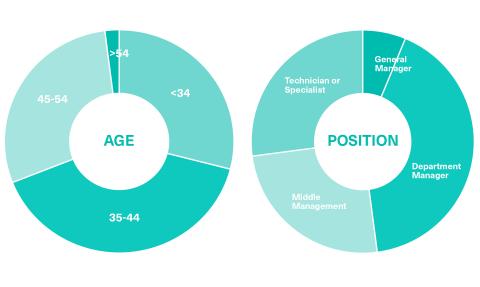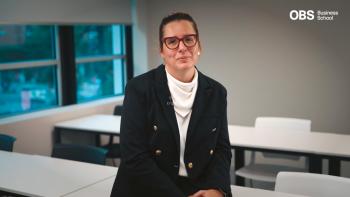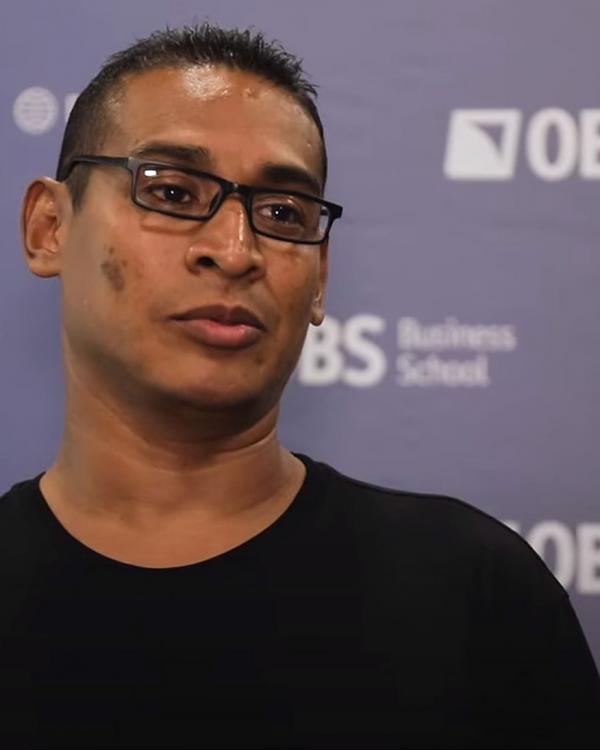
Master in Information Systems and Technology Management
- ONLINE
- 60 ECTS
- 7500€
- OPEN CALL
- 12 MONTHS
- SPANISH
The Master in Information Systems and Technology Management allows you to acquire the necessary skills and competencies to effectively manage IT processes within the business environment, implementing cross-cutting strategies in information systems aligned with the objectives of companies.

Master in Information Systems and Technology Management (Spanish)

Universitat de Barcelona
Get a double degree from our academic partner, the reference university in Catalonia and Spain with more than 560 years of history behind it.

ISACA's certification
This Master prepares you for the CISA (Certified Information System Auditor) certification awarded by ISACA (Information Systems Audit and Control Association).

Ranking Eduniversal
The Master in Information Systems and Technology Management obtained the 2nd position in Spanish in the Information Systems Management category.
Master's Degree in Information Systems and Technology Management’s Syllabus
Our program is structured in 3 blocks and culminates with the Master's Thesis. In addition, during the development of the program, there will be three voluntary bootcamps and different additional activities.
Block 1. Strategic Management
Block 2. IT Management
Block 3. IT Governance
Master's Final Project
Bootcamps and Additional Activities
1. Strategic management
The experiences and interactions that organizations have with digital information result from a delicate process of knowledge and alignment with carefully synthesized strategic objectives woven into a fabric of technological resources. Throughout this module, students will learn everything there is to know about information systems in the Organization and Society, including managerial alignment, innovation and current trends, among other things.
Professor: Noelia Valverde Pérez, Head of the Operations Department at Agroseguro.
VIEW LINKEDIN
Innovation is the capacity developed by an individual to find solutions to the challenges posed. This ability, in the hands of the CIO, leads to new paradigms that position the organization in a privileged position with respect to the competition. Experience clearly shows how those organizations that have not been able to develop an adequate capacity for change are seeing their competitive capacity significantly reduced. Throughout this course you will delve into topics such as technology watch, new business models and business/technology architecture, among others.
Professor: Ricard González Tejero, CIO at Conecta Wireless.
VIEW LINKEDIN
Digital transformation is the reinvention of value chains in an organization through the use of digital technologies. There are different ways, models and processes to improve the way the organization performs this transformation. In this module, you will see the process of developing a transformation plan, from market analysis, through business models and transformation processes.
Professor: Gustavo Daniel Díaz Grande, Director of DATA & AI Business en Conecta Wireless
2. IT Management
Implemented information services must be available in the way each business needs. In this module, students will learn about national service agreements, problem management, change management and maintenance management, among others.
Professor: Evis Luzmila Rosales Contreras, IT Service / IT Project Manager Consultant at SIX Group.
VIEW LINKEDIN
The main characteristics of initiation, culmination and conclusion, which characterize projects, are the preferred mechanism for adapting the organization's technological foundations to new business needs. Prioritizing and managing project execution is an art that combines deployment strategy, resource management and stakeholder and user acceptance. In this subject, students will delve into topics such as implementation methodologies, areas of knowledge related to project management and reporting for projects, among others.
Professor: Rosario Fresneda Fernández, Senior Project Management Freelance Consultant.
VIEW LINKEDIN
In the new digital world, information consumption is exponential. Moreover, the creation and exchange of new information by users is constant, which added to the generation of interpretive and contextual information, means that we find ourselves in a situation of infinite information crossing. In this module, students will analyse the exploitation of this information to support the strategic objectives of organizations.
Professor: Óscar Quero Hijano, Director del departamento Tech&Supply en EAE Business School Madrid.
VIEW LINKEDIN
Good management of the IT team strengthens the commitment of people in the strategy and promotes the development of solutions for the business. Only with carefully managed professional involvement can knowledge be tailored to the company's needs in an area where speed and technological evolution surpass other sectors. Financial management of the technical team and the service area is crucial for the effective direction of the information systems department. Throughout this subject, students will see aspects such as personnel management, budgetary and financial management and knowledge management, among others.
Profesor: Salvi Hernández Barjola, Managing Director at Sigma Consulting Asociados.
VIEW LINKEDIN
3. IT Governance
Cybersecurity is the cornerstone of business growth in the digital era. In this module, students will learn the best techniques to position cybersecurity within organizational structures and will become acquainted with different organizational models applicable in real business environments. You’ll understand said models’ dependencies, main advantages and incompatibilities, as well as explore the best strategies to track the progress of each initiative, measuring its advancement and and reducing associated risks.
Professor: Miguel Agüero González, Head of IT Audit at National Telecommunications Company at Entel S.A.
VIEW LINKEDIN
How is technological risk measured? What are the primary information security vulnerabilities? What is a corporate risk map? How are governance processes structured? How is a compliance program organized? In this module, students will explore these questions and find the right answers to consolidated their understanding of organizational control.
Professor: Martín Piqueras Caro, Senior Executive Partner at Gartner.
VIEW LINKEDIN
The procurement and provision of IT goods and services has undergone a major transformation in recent years; the virtualisation and globalisation of IT has redefined traditional legal concepts and relationships. Furthermore, the technological orientation of organisations and individuals, as well as of commerce and consumption, creates risks for fundamental rights and property rights. In this sense, CIOs must adhere to codes of conduct and rules that respect the legal system. In this module you will see aspects such as the contracting of goods and services, intellectual and industrial property, regulatory compliance and the guarantee of fundamental rights, among others.
Professor: Josep Cañabate Pérez, Director of the Legal Studies and Opinions Service at Iurislab Legal Clinic from the Faculty of Law at the Autonomous University of Barcelona.
VIEW LINKEDIN
Master's Final Project and Additional Activities
This programme is designed to complement the content of the thematic blocks with the necessary training to achieve their internalisation. The training is conceived from a threefold perspective: technical assistance, personal support and individual and group challenges that are necessary to achieve the objectives set.
Pre-Masters Bootcamps
The student will have the opportunity to take 3 Pre-Master Bootcamps that will be opened progressively and can be taken at any time. Once the course has been completed and passed, a certificate of completion will be awarded.
- Bootcamp 1. Personal Branding
- Bootcamp 2. Data Storytelling
- Bootcamp 3. Creative thinking and innovation
In addition, students will also have the opportunity to take these pre-master courses; however, these are available in English only:
- Building Your Professional Brand for Employability and Career Success
- Finance Fundamentals
Introductory workshop | Campus Training
Before the start of the academic year, students will have the opportunity to attend an introductory workshop on the Campus, where they will be provided with the necessary tools and knowledge for the correct use of the platform during the academic year.
Professional Development Programme (PDP)
Two weeks before the start of the academic year, students will be able to participate in a professional development programme, where they will work hand in hand with a teacher to develop skills such as time management, productivity, stress management and emotional intelligence. Once the student has successfully completed the workshop, he or she will receive a certificate of completion.
The Master's thesis consists of developing an innovative idea with which the student can demonstrate improvements in competitiveness and productivity in a new or existing process. The goal of this project is for the student to apply the knowledge acquired during the master and to demonstrate the transformational value of aligning the appropriate management of IT and technological resources with management objectives.
The Master in Information Systems and Technology Management is complemented by lectures and seminars given in each of the blocks. These additional activities are carried out by renowned professionals in business management who present their experiences and practical cases through videoconferences.
Bootcamp: Lean IT
Lean IT is the extension and adaptation of "lean manufacturing" (a management model widely used in industrial processes) in IT environments. Its central concern, applied in the context of IT, is the elimination of waste, both in the act of consuming the service (external users/customers) and in the act of providing the service (IT).
The bootcamp will help students improve the services they offer to their clients, eliminating everything that is not aimed at providing value.
Professor: Gonzalo Cuatrecasas Freixas, Cyber Security Manager at Axel Johnson International AB.
VIEW LINKEDIN
Bootcamp: Preparation for ISACA's CISA Certification
ISACA Valencia gives an optional preparation bootcamp for the CISA certification (Certified Information Systems Auditor), which endorses the knowledge of professionals in Information Systems Audit Processes, Governance and IT Management, development and implementation of information systems, information security and operations of information systems. This is a specialised bootcamp for the preparation of the exam for this certification, where the student will obtain specific study material, terminology, examples, mock exams, etc.
Professor: Albert Martínez Aparisi, CIO at Hospital Francesc de Borja.
VIEW LINKEDIN
Bootcamp: Preparation for the ITIL Foundation examination
ITIL is a framework of best practices and recommendations for delivering IT services. ITIL Foundation certifies your basic knowledge of IT Service Management and its terminology on an ITIL basis, which is why we’ve designed this bootcamp, aimed at preparing the students for the essential ITIL Foundation exam.
Professor: Evis Luzmila Rosales Contreras, IT Service / IT Project Management Consultant at SIX Group.
VIEW LINKEDIN
Company visits
During the development of the programme, the student will have the opportunity to attend synchronous videoconferences with professional experts that will share their experience and provide advice on some of the best practices in the sector.
Webinars
Most of the training is done asynchronously, that is, the exchange of knowledge is done through a platform that allows sharing written texts without the need for people to be connected at the same time.
Additionally, in each of the modules, synchronous sessions or 'webinars' are organised, where all participants are connected at the same time through an application, which allows the exchange of knowledge in 'real time'.
Students taking this Master’s will have the opportunity to prepare for the following certifications*:
- ISACA CISA Certification
- ITIL Foundation Certification
*The cost of the certifications is not included in the price of the programme.
In addition, students will have the opportunity to prepare for the following certifications**:
- ICN Business IT Certification
- Scrum Certification (Product Owner & Scrum Master)
**The cost of the certifications and the preparatory course is not included in the programme fee.
Methodology

OBS has an online methodology where the student is always at the core of the process. Said methodology is backed by active and internationally renowned professors who share their knowledge to enhance the professional development of students through a flexible, collaborative method with personalized monitoring. The goal is to create a unique educational experience that allows the assimilation of knowledge in a practical way. Given that the fundamental pillar of the Student ON methodology is the student, each of them has their own Program Manager throughout the course, an academic figure that accompanies the student in a personalized way.
Diploma
After successfully finishing the Master's degree, and having completed the relevant procedures, you will receive the Master's degree from OBS Business School. In addition, and provided that you meet the established academic and administrative requirements, you will obtain a Lifelong learning Master's degree from the Universitat de Barcelona (UB).
In order to obtain it, you must have a university degree. In the exceptional case of not having this degree and having passed the Master's evaluations, you will obtain a Higher University Diploma from the Universitat de Barcelona (UB).
At OBS Business School we are committed to having our own degree, which allows us to quickly update and adapt the programmes in each edition to be at the forefront of the educational level demanded by companies today. Our programmes are designed for professionals who want to strenghten their management skills and learn through an international experience.

Admission Process
The fundamental aim of our admissions process is to ensure the suitability of candidates. All participants should get the most out of this learning experience, through a context in which it is possible to develop long-term relationships with classmates, faculty and alumni.
After completing the application form for one of our programmes, you will receive an e-mail with information about the School and a member of the Admissions Department will contact you to start the admission process.
Once you have successfully passed the personal interview, you must submit all the required documentation to continue the admission process and certify that you meet the requirements of the student profile. After the Admissions Committee, if it is positive, you will be able to register and enrol in the programme you have applied for.

Student Profile
The Master in Information Systems and Technology Management is aimed at professionals who wish to work in the management, administration or consultancy of information systems and technologies.

Professional Opportunities of the Master in Information Systems and Technology Management
This Master’s degree will help you boost your professional career as:
- CIO (Chief Information Officer)
- Information Technology Manager
- Information Systems Manager
- Process and organisational manager.
- Systems Analyst
- Tech Consultant
- Business Application Analyst
- IT Arquitect


